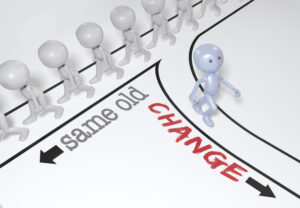“Things” are neutral until we assign meaning to them. We can barely help ourselves from doing so unless we consciously train ourselves, and even then, it is almost impossible not to be making or assigning meaning to things. We assign meaning based on a point of reference, usually, something we know or an experience we’ve had that left an impact and remained ingrained in our neuronal circuit. Other times it may have been a past experience that has repeated itself, and the brain picks it up as the “new normal” and makes the process of meaning-making automatic. In either case, the moment anything associated with such a memory presents itself, we perceive it through the lens of our past memories and experiences.
What this tells us, then, is that our mind is preoccupied with past thoughts. Our feelings and emotions are the product of past-based thoughts, and whether we are dealing with things in the present or future, we are making decisions or projecting, or making meaning, all based on our past.
We dedicated the first few sections of our Psychotherapy Certificate Course to this concept. Now, NLP (Neurolinguistic Programming), the Science of Life, which touches upon everything related to Neuroscience, and to our psychology, and beyond, brings us a set of insights about meaning. One of them is that the meaning we make of things is based not only on the past but also on our state of mind. This means, being in a helpful state is more likely to result in helpful meanings, though still based on the past, while being in an unhelpful state of mind is more likely to lead to an unhelpful meaning.
On an intellectual level, most of us appreciate that we are the ones assigning meaning to things. However, it usually stops there. Understanding the ramifications of this is profound when we take the time to look at the ripple effect. If we considered that we assign meaning to things, situations, circumstances, events, or experiences, then we would also have to consider that we can choose a meaning that works for us. Of course, for this to happen, we are to first become more aware of when we are assigning meaning, how we are assigning meaning, and how fast it happens, especially when we are not paying attention.

“Anchoring: Forming New and Breaking Old” is a powerful tool in NLP that can help us master the above understanding. If you are interested in the mastery of such transformative tools, please join us for our next NLP class, scheduled for Saturday, November 21, 2020, 4-6pm.
We look forward to seeing you then,
Karen and Mardoche
About the Authors:
Karen Dubin-McKnight, PhD, LCSW, is a Columbia-trained Social Worker with wide clinical, teaching, and supervision experience. She also has a background in management, mentorship, and leadership that spans almost 20 years. Her added passion is in advocacy, coaching, public relations, and mediation. Her goal is to ensure that social workers and women feel empowered and have a voice “at the table.” She has previously held Executive level positions, and two other directorships in different organizations. She is currently Adjunct Faculty at Columbia University School of Social Work and Adelphi University School of Social Work. She also maintains a private practice, working with individuals who have experienced loss and trauma, and also provides clinical and management supervision.
Mardoche Sidor, MD is a Harvard-trained Quadruple Board Certified Psychiatrist, Assistant Professor of Psychiatry at Columbia University, School of Physicians and Surgeons. He is trained in and taught all the major psychotherapeutic modalities, including and not limiting to CBT, DBT, Family Systems, and Psychodynamic Psychotherapy. He is also the author of 3 books including Journey to Empowerment; Discovering Your Worth; and The Power of Faith. Dr. Sidor has worked both as a primary care physician and as Medical director in three different settings, including as Chief Medical Officer of Center for Alternative Sentencing and Employment Services (CASES). He is the Founder and CEO of the SWEET Institute.